A chicken tractor is a portable enclosure used to move chickens around the yard. Our chicken tractor is not a housing unit, but some tractors can be built to house chickens. Ours is essentially a mobile playpen for use during the day.
As a change of scenery for non-free range chickens
My Original Plan
At the time we built our tractor, we weren’t planning to let our flock free-range but did want them to have the nutritional benefit and mental stimulation of foraging in the grass. I didn’t want the chickens destroying our annuals and garden, pooping everywhere or roaming into the neighbor’s yard.
The Reality
I changed my mind and decided to let the chickens free-range. The tractor quickly began serving many unintended purposes. Surprisingly, the girlz stay out of the neighbors’ yards. They did destroy some annuals and made a salad bar of my hostas, but I can live with that. The poop? I just clean up after them regularly. No biggie.
Uses for a chicken tractor:
As a time-out for broody hens that need to be ‘broken,’ or a step-down unit for injured birds on the mend. Finally, as a training facility for the Avian Olympics in Synchronized Preening:
Most of the materials we used to build our tractor were re-purposed or leftover items from other projects. Total cost was about $60.00. Entertainment value from watching my two year old ‘help’ build it: priceless.
After the base was built and wheels attached, in went the rudimentary nesting boxes. The hinged door on the back of the nest boxes opens from the outside for egg retrieval. The black, ribbed material used to make the “hoop” portion of the tractor is irrigation tubing, commonly used for underground sprinkler systems. It’s hollow and very lightweight. Originally we planned on using PVC for the tractor but we learned that PVC isn’t very durable for this purpose and will crack eventually.
It was important to me that this tractor be lightweight. The only predators we worry about during the day are the hawks, so we used plastic poultry netting instead of hardware cloth. It cost $12.00 for a 36″x 50′ roll at Lowe’s.
We attached the netting with zip ties.
Introducing the girlz to the tractor for the first time
Bessie and Clarice had other ideas in mind for its use.
Kathy Shea Mormino
Affectionately known internationally as The Chicken Chick®, Kathy Shea Mormino shares a fun-loving, informative style to raising backyard chickens. …Read on


shop my SPONSORS
A chicken tractor is a portable enclosure used to move chickens around the yard. Our chicken tractor is not a housing unit, but some tractors can be built to house chickens. Ours is essentially a mobile playpen for use during the day.
As a change of scenery for non-free range chickens
My Original Plan
At the time we built our tractor, we weren’t planning to let our flock free-range but did want them to have the nutritional benefit and mental stimulation of foraging in the grass. I didn’t want the chickens destroying our annuals and garden, pooping everywhere or roaming into the neighbor’s yard.
The Reality
I changed my mind and decided to let the chickens free-range. The tractor quickly began serving many unintended purposes. Surprisingly, the girlz stay out of the neighbors’ yards. They did destroy some annuals and made a salad bar of my hostas, but I can live with that. The poop? I just clean up after them regularly. No biggie.
Uses for a chicken tractor:
As a time-out for broody hens that need to be ‘broken,’ or a step-down unit for injured birds on the mend. Finally, as a training facility for the Avian Olympics in Synchronized Preening:
Most of the materials we used to build our tractor were re-purposed or leftover items from other projects. Total cost was about $60.00. Entertainment value from watching my two year old ‘help’ build it: priceless.
After the base was built and wheels attached, in went the rudimentary nesting boxes. The hinged door on the back of the nest boxes opens from the outside for egg retrieval. The black, ribbed material used to make the “hoop” portion of the tractor is irrigation tubing, commonly used for underground sprinkler systems. It’s hollow and very lightweight. Originally we planned on using PVC for the tractor but we learned that PVC isn’t very durable for this purpose and will crack eventually.
It was important to me that this tractor be lightweight. The only predators we worry about during the day are the hawks, so we used plastic poultry netting instead of hardware cloth. It cost $12.00 for a 36″x 50′ roll at Lowe’s.
We attached the netting with zip ties.
Introducing the girlz to the tractor for the first time
Bessie and Clarice had other ideas in mind for its use.



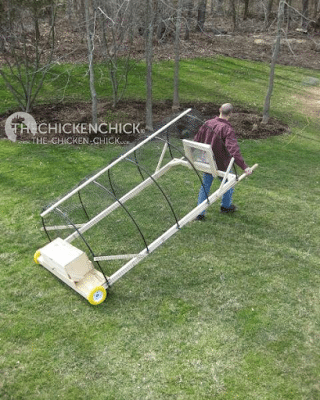
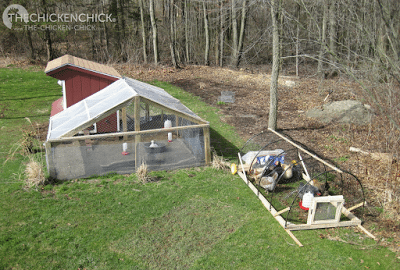
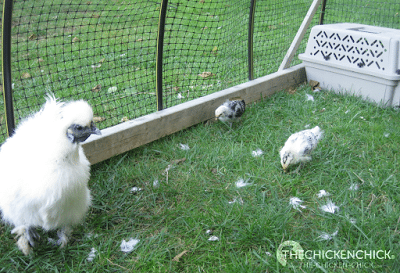
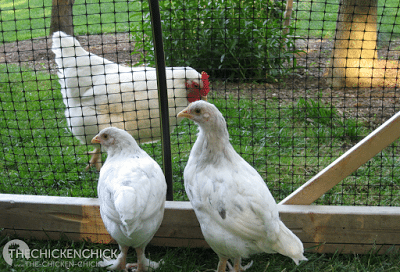
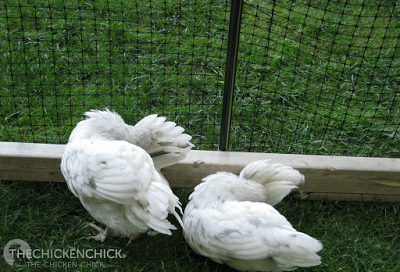
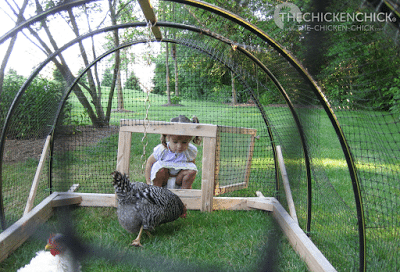
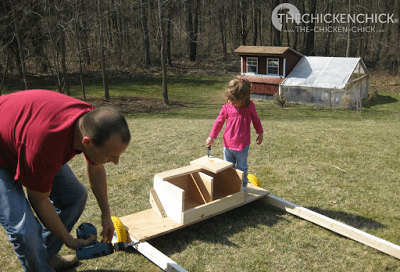
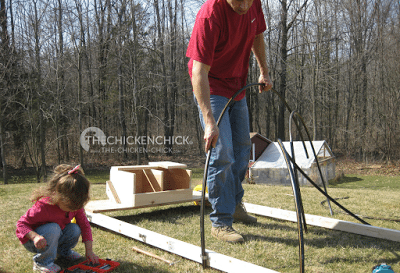
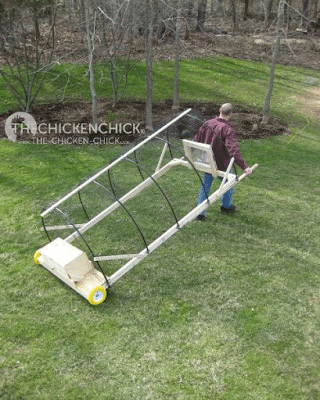
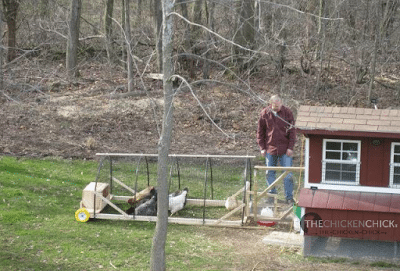
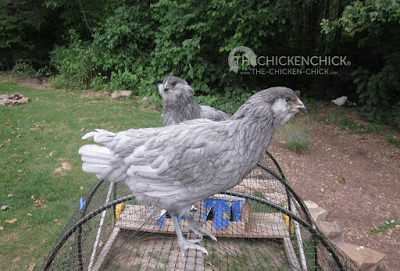
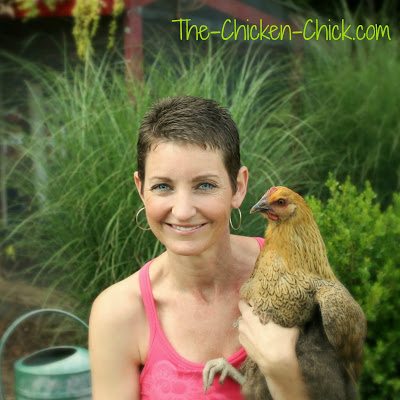















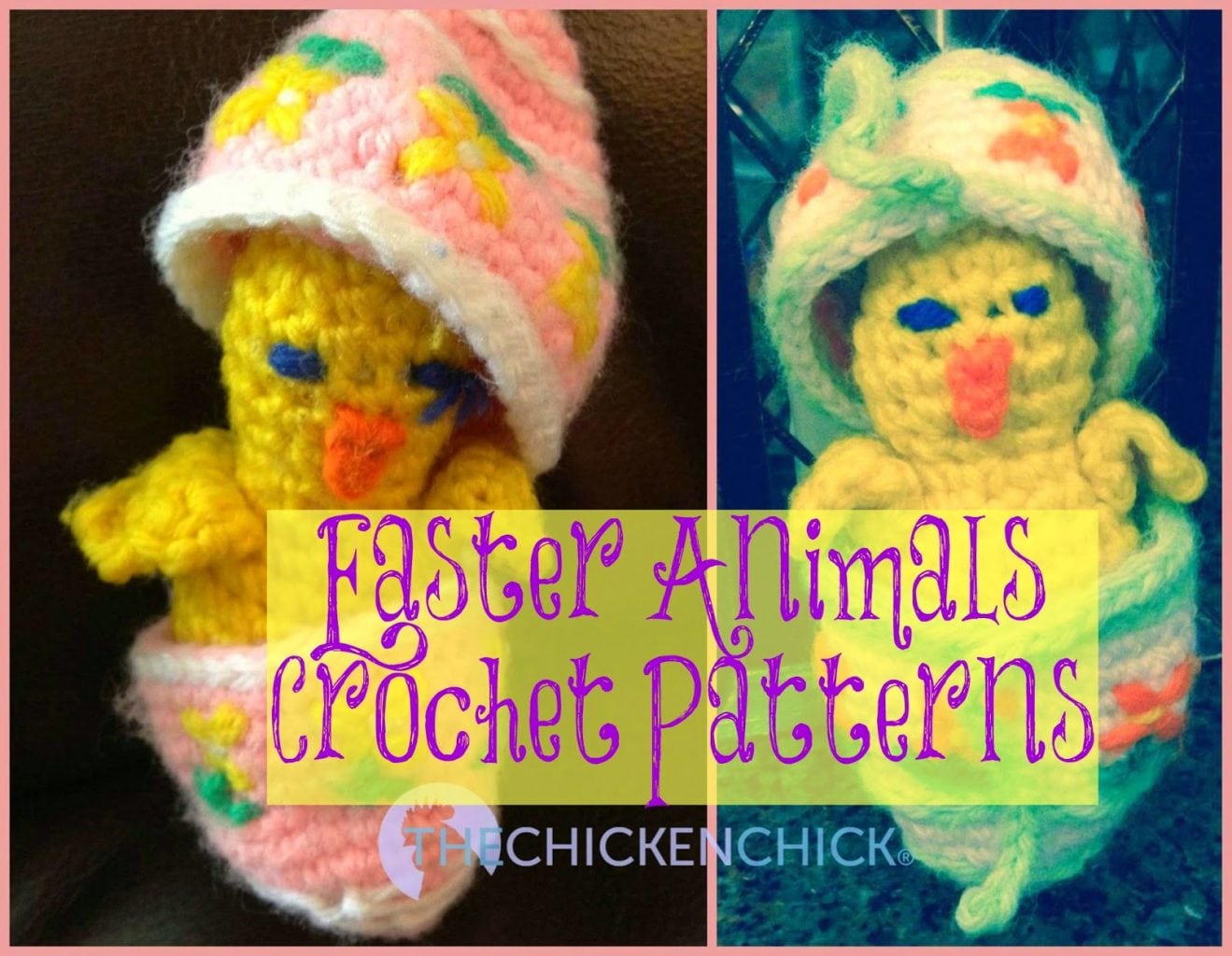






I love it. Good information about the PVC vs irrigation tubing. I let my chickens free range now. But it took me about a year to let them out. They are so happy to run around and everytime I go out the door, they come running to me.
Thanks, Charlotte! We did the same thing. I was hesitant about free-ranging but, despite the obvious risks, I wouldn't have it any other way. Moving lawn ornaments, that's how I see it! :)
Wonderful post! Thank you!
Thank you, Lauren! It was my pleasure. (I had the easy part in this tractor project: camera duty!)
Isn't it funny how just about everything chicken gets revised, reworked, rebuilt, and repurposed! Now matter how much homework and research you do before building, there are always changes out of necessity or just because we think it might work or look better. LOL! Love the tips.
Sandy, you are SO right! I wish I had a nickel for every project that got re-designed in my backyard! My 'Virtual tour de coop' blog post has many of the revisions documented in it but there were many more!
Once again, I've learned something from you. I wished I would've read this before I built my 'tractor'. Now-a-days, my tractor has been turned into a semi-permanent fixture. I can move it with some disassembly, but it is so heavy. Next build, I'll use the Pages for Q & A.
Mike
I'm happy to hear I helped you learn something. I'm sure your tractor will have plenty of uses even if portability isn't its main selling point. :)
Fantastic Job! Thumbs Up!
Thanks Pattie! :)